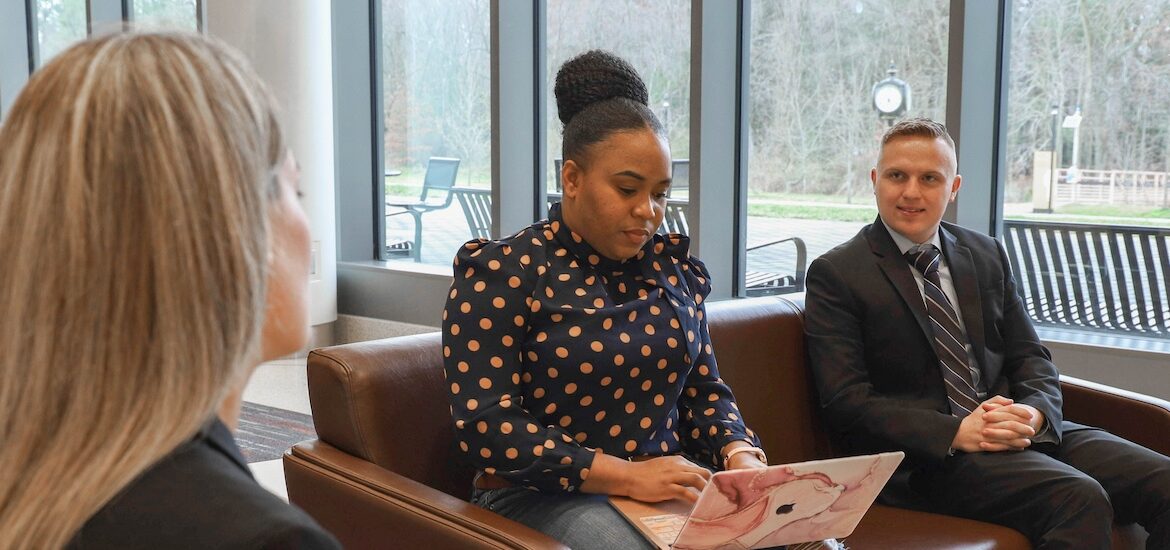An Insightful Look Answering ‘What Is Economics?’ & Economics Major Jobs
Pursuing an economics degree offers a comprehensive understanding of how societies allocate resources, make decisions and address challenges in various sectors. If you’ve ever wondered ‘what can I do with an economics degree?’, the answer is: quite a lot. This major equips students with analytical and critical thinking skills applicable to myriad career opportunities. Industries such as banking, financial institutions, government agencies and consultancy firms hire economics majors upon graduation. The major focuses on learning to analyze the world in terms of tradeoffs and incentives — that is, to “think like an economist.”
As one then-senior Rowan University economics major put it when we featured her, “Once my father advised me to study finance or economics because he considered it a great path to success since economics is related to all the huge businesses, companies, institutions or even government jobs.”

What Does an Economics Major Learn?
An economics major delves into the principles governing the production, distribution and consumption of goods and services. Within the economics major at Rowan University, the curriculum encompasses a broad range of topics, including microeconomics, macroeconomics, econometrics and international economics. This interdisciplinary approach integrates aspects of finance, political science, sociology and international relations, providing a well-rounded education.
Upper-level elective courses within the economics major include classes such as:
- Contemporary Economic Systems
- Global Economics
- History of Economic Ideas
- American Economic History
- Environmental Economics
- Current Economic Problems and Policies
- Women in the Economy
- Selected Topics in Economics
- Money and Banking
- Public Finance
- Labor Economics
- Socio-Economic Applications of Blockchain
- Health Economics
- Industrial Organization
- Law and Economics
- Urban Economics
- Sports Economics
Students have the opportunity to tailor their studies to align with specific interests and career goals, ensuring a personalized and relevant educational experience. In addition, strong dual majors to pair with an economics degree include psychology, sociology, math, law, journalism and political science.
Career Paths: Where Can an Economics Degree Take You?
An economics degree opens the door to a wide array of career opportunities across various industries. Economics major jobs include roles such as:
- Financial Analyst: Assess financial data to guide business decisions.
- Economic Consultant: Analyze economic trends to advise organizations.
- Policy Analyst: Evaluate and develop policies for governmental or non-governmental organizations.
- Market Research Analyst: Study market conditions to determine potential sales of a product or service.
- Data Analyst: Interpret complex data to help companies make informed decisions.
The demand for economics professionals spans sectors such as finance, healthcare, education and government. The analytical and problem-solving skills acquired through the program are highly valued, offering graduates a competitive edge in the job market.
Two Alumni Success Highlights
After Elona Noka graduated, she left her part-time job as a junior accountant and stepped into a full-time role as a audit associate. Now five years into her career post-graduation, she has been employed as an asset wealth management tax team member for three years. She has also earned her master’s degree in finance. When we featured her as a senior in 2020 in a profile about her student experience as an economics major, she said, “Studying economics is the key of achieving success. You will have many chances on becoming a great economist and moreover you will have no limits on becoming a CEO, CFA or a CPA.” Elona’s LinkedIn reflects that she has, in fact, growing a successful career toward her professional goals.

Today Justin Kelsall, a 2014 graduate of the economics major, works as a Bank Secrecy Act (BSA) analyst III at a bank. He is also a longtime adjunct professor at his alma mater, teaching microeconomics, macroeconomics and an elective course called Economics of Cannabis. He earned his master of science of applied economics from The Johns Hopkins University.
Why Choose Rowan for Your Economics Degree?
The major emphasizes flexibility, with academic advisors counseling you how to specialize, add a minor or double major, while staying on track to graduate on time.
In the classroom, small classes mean more opportunity for you to build meaningful relationships with professors. These professors will oftentimes be the foundation of your future professional network, serving as a professional reference, writing letters of recommendation for graduate school and recommending you to industry connections for internships and professional opportunities.
In addition, the Office of Career Advancement offers multiple career fairs, every semester. The office also offers resume review, interview practice, and more – even a free “Suit our Students” closet of professional attire for students.
The collaborative, interdisciplinary nature of Rowan’s academic culture is such that you you will work in tandem with student groups across a wide variety of majors.
The program emphasizes experiential learning, offering opportunities for internships, research projects and collaborations with industry professionals. These experiences not only enhance classroom learning but also provide practical skills and networking opportunities that are invaluable in the professional world.
Embark on Your Economics Journey
Earn your bachelor’s degree in economics from Rowan University to set this path in motion.
Alumni Success Stories
Explore how our alumni propel their Rowan University education into lasting success, as highlighted through our alumni success series. From Rowan University student to lifelong member of the Rowan University Alumni Association, Rowan Profs thrive at every stage of their journey. Go Profs!

